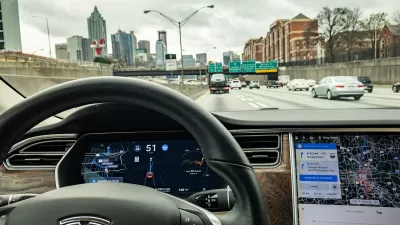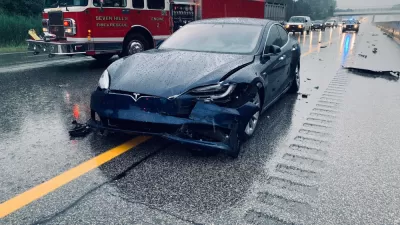On the heels of multiple crashes and a federal investigation, a state law bars the company from calling their software Full Self-Driving to avoid misleading consumers about the need for driver assistance.

California law now bans Tesla from describing their software as Full Self-Driving (FSD), citing concerns that the term could mislead consumers, reports Marco Marcelline for PC Mag.
The law, sponsored by Democratic State Sen. Lena Gonzalez, bans California car dealers and manufacturers from 'deceptively naming or marketing' a car as self-driving if equipped with partial autonomous features that still require humans to pay attention and handle the driving.
While Tesla’s website states that its features “require active driver supervision and do not make the vehicle autonomous,” critics have long accused the company and its founder, Elon Musk, of misleading buyers and putting people in danger through their marketing language. According to Marcelline, “Last week, the National Highway Traffic Safety Administration (NHTSA) initiated two more special crash investigations into Tesla accidents where FSD is alleged to have been a factor in the crash.” The NHTSA is also investigating General Motors subsidiary Cruise.
FULL STORY: California Bans Tesla From Calling Software 'Full Self-Driving'

Planetizen Federal Action Tracker
A weekly monitor of how Trump’s orders and actions are impacting planners and planning in America.

Chicago’s Ghost Rails
Just beneath the surface of the modern city lie the remnants of its expansive early 20th-century streetcar system.

San Antonio and Austin are Fusing Into one Massive Megaregion
The region spanning the two central Texas cities is growing fast, posing challenges for local infrastructure and water supplies.

Since Zion's Shuttles Went Electric “The Smog is Gone”
Visitors to Zion National Park can enjoy the canyon via the nation’s first fully electric park shuttle system.

Trump Distributing DOT Safety Funds at 1/10 Rate of Biden
Funds for Safe Streets and other transportation safety and equity programs are being held up by administrative reviews and conflicts with the Trump administration’s priorities.

German Cities Subsidize Taxis for Women Amid Wave of Violence
Free or low-cost taxi rides can help women navigate cities more safely, but critics say the programs don't address the root causes of violence against women.
Urban Design for Planners 1: Software Tools
This six-course series explores essential urban design concepts using open source software and equips planners with the tools they need to participate fully in the urban design process.
Planning for Universal Design
Learn the tools for implementing Universal Design in planning regulations.
planning NEXT
Appalachian Highlands Housing Partners
Mpact (founded as Rail~Volution)
City of Camden Redevelopment Agency
City of Astoria
City of Portland
City of Laramie





























